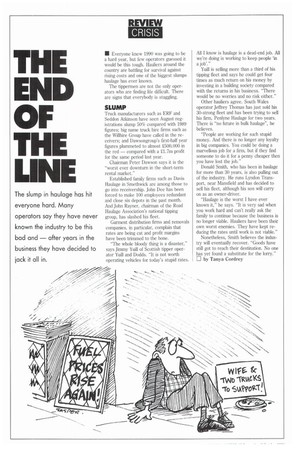THE END OF THE LINE
Page 28

If you've noticed an error in this article please click here to report it so we can fix it.
The slump in haulage has hit everyone hard. Many operators say they have never known the industry to be this bad and — after years in the business they have decided to jack it all in.
• Everyone knew 1990 was going to be a hard year, but few operators guessed it would be this tough. Hauliers around the country are battling for survival against rising costs and one of the biggest slumps haulage has ever known.
The tippermen are not the only operators who are finding life difficult. There are signs that everybody is stuggling.
SLUMP
Truck manufacturers such as ERF and Seddon Atkinson have seen August registrations slump 50% compared with 1989 figures; big name truck hire firms such as the Willhire Group have called in the receivers; and Dawsongroup's first-half year figures plummeted to almost 2500,000 in the red — compared with a 21.7m profit for the same period last year.
Chairman Peter Dawson says it is the "worst ever downturn in the short-term rental market."
Established family firms such as Davis Haulage in Smethwick are among those to go into receivership. John Dee has been forced to make 100 employees redundant and close six depots in the past month. And John Rayner, chairman of the Road Haulage Association's national tipping group, has slashed his fleet.
Garment distribution firms and removals companies, in particular, complain that rates are being cut and profit margins have been trimmed to the bone.
"The whole bloody thing is a disaster," says Jimmy Yuill of Scottish tipper operator Yuill and Dodds. "It is not worth operating vehicles for today's stupid rates. All I know is haulage is a dead-end job. All we're doing is working to keep people 'in a job'."
Yuill is selling more than a third of his tipping fleet and says he could get four times as much return on his money by investing in a building society compared with the returns in his business. "There would be no worries and no risk either."
Other hauliers agree. South Wales operator Jeffrey Thomas has just sold his 30-strong fleet and has been trying to sell his firm, Penl}me Haulage for two years. There is "no future in bulk haulage", he believes.
"People are working for such stupid money. And there is no longer any loyalty in big companies. You could be doing a marvellous job for a firm, but if they find someone to do it for a penny cheaper then you have lost the job."
Donald Smith, who has been in haulage for more than 30 years, is also pulling out of the industry. He runs Lyndon Transport, near Mansfield and has decided to sell his fleet, although his son will carry on as an owner-driver.
"Haulage is the worst I have ever known it," he says. "It is very sad when you work hard and can't really ask the family to continue because the business is no longer viable. Hauliers have been their own worst enemies. They have kept reducing the rates until work is not viable."
Nonetheless, Smith believes the industry will eventually recover. "Goods have still got to reach their destination. No one has yet found a substitute for the lorry."
by Tanya Cordrey
































































































